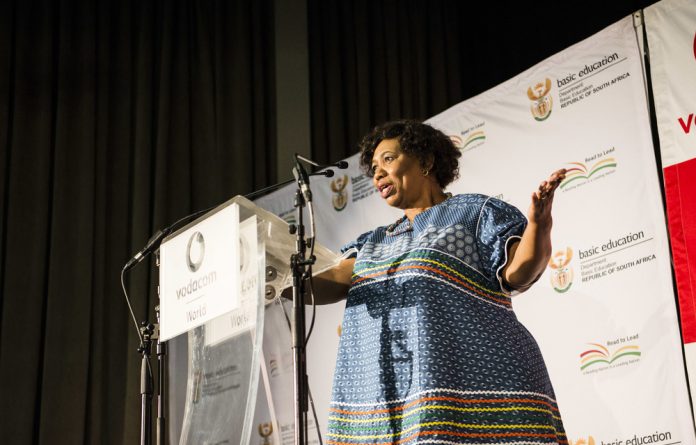By Lehlohonolo Mofokeng
‘I will rather repeat my matric than to lose my life,’ said one of my learners upon hearing that all the grade 7 and 12 learners, together with their teachers, were expected back at school in the next few days amidst the Covid-19 pandemic.
My learner’s reaction is echoed by many in the education fraternity and beyond for one reason—that you can regain whatever academic work that has been lost but you cannot replace a human life. Clear on the evening of 19 May 2020 was the fact that the Minister of Basic Education (DBE), Angie Motshekga, cares more about her political career than the lives of our people.
Take, for example, her statement: “I cannot guarantee that nobody will die”. As though this was insufficient, she dropped another bomb: “We want to focus on the core business of basic education which is curriculum implementation”. Between saving lives or saving the academic year, if you wondered which one the Minister prioritized, you know now. Upon hearing this, I immediately reflected on what Chinua Achebe said in Things fall apart: “It’s true that a child belongs to its father. But when a father beats his child, it seeks sympathy in its mother’s hut. A man belongs to his fatherland when things are good and life is sweet. But when there is sorrow and bitterness he finds refuge in his motherland. Your mother is there to protect you.”
Undoubtedly, the Minister as a ‘mother’ isn’t protecting the children and President Cyril Ramaphosa as a ‘father’, because he approved this decision, showed no sympathy either. Our children, as a result, now wonder who is to protect them. If the DBE cannot assure children that their lives will not be compromised, how do you expect effective teaching and learning to happen? Have effective teaching and learning ever triumphed where fear reigned?
When a caller asked how learners with pre-existing health conditions will be academically supported while absent from school, the Minister relegated this responsibility to schools. This is problematic to me for one reason—that on top of scratching their heads on how they are going to use their already stretched human resources (teachers), schools have to worry further about how they should avail educational resources to poor learners who suffer from health conditions from which they did not choose to suffer.
As a teacher who teaches in township and rural settings, I know how we are struggling to provide remote learning to our learners during this lockdown period, due to limited technological and financial resources. I don’t see how it will be different this time around. This begs the question: how do you begin to open schools when you don’t have concrete plans in place to cover all the bases? Or will it be one of those pieces that poor schools have to pick up for themselves, as is often the case? It was also clear to the Minister that since we get paid, we should work—regardless of whether the conditions allow or not.
I found some solace in what Chimamanda Ngozi said in Half of a Yellow Sun: “… it’s wrong of you to think that love leaves room for nothing else. It’s possible to love something and still condescend to it.”
Annually, where I currently teach, a secondary school located in the Free State province, without fail we fill in countless forms for learners who have to be referred to Educational Psychologists for various special educational needs. But I have not, even once, seen any fruitful outcome out of this important but neglected intervention by the Department. Available research evidence proves this problem is not unique to my school. For example, in their 2018 survey, the Organisation for Economic Co-operation and Development (OECD) found that 60% of our principals report a shortage of support personnel, with the OECD average standing at 33%. Given these grin figures, how is the DBE going to miraculously deliver on the promise that counsellors and psychologists that are hired by them “will be able to use their skills to support schools” when this doesn’t happen under normal circumstances?
The Minster also alluded to redirecting budgetary allocations to make way for new challenges, such as hiring additional teachers who will replace some of our colleagues with comorbidities. It remains to be seen whether this will translate to anything tangible when some of the schools go months—and sometimes years—without teachers owing to failure by some of the Provincial Education Departments (PEDs) to fill-in teacher posts.
On top of teacher shortages, crowding still remains a daunting challenge in most of our schools, as one study shows. Given this, how is social distancing going to be observed in our schools? On how schools are going to achieve this, I was intrigued by paragraph 5.2.5 in the ‘Basic Education Standards Procedure’ recently released by the DBE. In it, they say: “Schools should work on the practicality of implementing social distancing per class to apply the 1.5m social distance norm, wherever practicable. Consequently the number of learners per classroom must be reduced, where possible.” My question is what happens if it is unpractical and impossible to reduce classes? Your guess is as good as mine.
The Minister said that “schools are good for children”. Yes, they may be, but only when it is feasible to open them. I suppose the Minister was implying that our schools are “good for children’’ when we still have infrastructural challenges in most of our schools, as the Amnesty International’s report states. I hope Ngozi’s words, “there are some things that are so unforgivable that they make other things easily forgivable”, don’t come back to haunt our Minister.
Lehlohonolo Mofokeng is an accounting teacher and the co-author of YOUR FIRST YEAR OF VARSITY.



